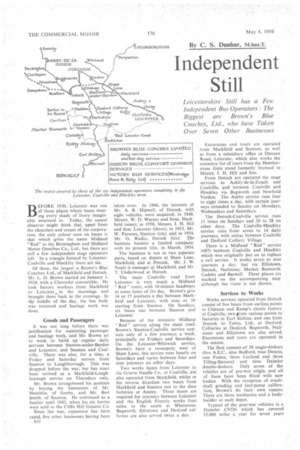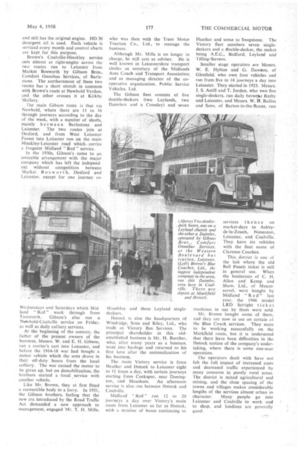Independent Still
Page 60

Page 61

If you've noticed an error in this article please click here to report it so we can fix it.
By C. S. Dunbar, m.inst.T.
Leicestershire Still has a Few Independent Bus Operators : The Biggest are • Brown's Blue Coaches, Ltd., who have Taken Over Seven Other Businesses
BEFORE 1930, Leicester was one of those places where buses wearing every shade of livery imaginable swarmed in. Today, the casual observer might think that, apart from the chocolate and cream of the corporation, the only colour seen on buses is that which gives the name Midland "Red" to the Birmingham and Midland Motor Omnibus Co., Ltd., but there are still a few independent stage operators left. In a triangle formed by Leicester. Coalville and Hinckley there are six.
Of these, the largest is Brown's Blue Coaches, Ltd., of Markfield and Ibstock. Mr. L. D. Brown started on January 1. 1924, with a Chevrolet convertible. He took factory workers from Markfield to Leicester. in the mornings and brought them back in the evenings. In die middle of the day, the bus body was removed and haulage work was done.
Goods and Passengers
It was not long before there was justification for separating passenger and haulage work, and Mr. Brown set to work to build up regular daily services between Stanton-under-Bardon and Leicester, and Stanton and Coalville. There was also, for a time, a Friday and Saturday service from Stanton to Loughborough. This was dropped before the war, but has since been revived as a Markfield-Loughborough serVice on Thursdays only.
Mr. Brown strengthened his position by buying the businesses of Mr. Hamblin. of Groby, and Mr. Bert Smith, of Stanton. He continued as a haulier until 1942, when his six lorries were sold to the Cliffe Hill Granite Co.
Since the war, expansion has been rapid, five other businesses having been 1326
taken over. In 1946, the interests of Mr. A. R. Hipwell, of Ibstock, with eight vehicles, were acquired; in 1948. Messrs. W. D. Warner and Sons, Markfield (nine); in 1950, Messrs. J. H. Hill and Son, Leicester (three); in 1953, Mr. W. Parsons, Stanton (six); and in 1954, Mr. G. Rudin, Ibstock (six). Tbe business became a limited company, with its present title, in March, 1954.
The business is run in two separate parts, based on depots at Shaw Lane, Markfield, and at Ibstock. Mr. J. W. Neale is manager at Markfield, and Mr. T. Underwood at Ibstock.
The main Coalvillc road from Leicester is very much a Midland "Red" route, with 10-minute headways at some times of the day. Brown's give 14 or 15 journeys a day between Markfield and Leicester, with nine or 10 starting from Stanton. On Sundays, six buses run between Stanton and Leicester.
Because of the intensive Midland "Red" service along the main road. Brown's Stanton-Coalville service consists only of a few journeys a week, principally on Fridays and Saturdays. On the Leicester-Whitwick service, Brown's have a monopoly west of Shaw Lane; this service runs hourly on Saturdays and varies between four and nine journeys on other days.
Two works buses from Leicester to the Grieve Needle Co.. at Coalville, are also operated from Markfield, whilst in the reverse direction two buses from Markfield and Stanton run to the shoe factories at Anstey. Three buses are required for journeys between Leicester and the English Electric works four miles to the south at Whetstone. Bagworth, Ellistown and Desford collieries are also served twice a day. Excursions and tours are operated from Markfield and Stanton, as well as from a subsidiary office at Duncan Road, Leicester, which also works the extensive list of tours from the Humberstone Gate stand formerly licensed to Messrs. J. H. Hill and Son.
From Ibstock are operated the stage services to Ashby-de-la-Zouch and Coalville, and between Coalville and Hinckley via Bagworth and Newbold Verdon. The Ashby service runs four to eight times a day, with certain journeys extended to Smisby on Mondays, Wednesdays and Saturdays.
The Ibstock-Coalville service runs 11 times on Sundays and 20 to 28 on other days. The Coalville-Hinckley service runs from seven to 14 daily journeys, with extras between Coalville and Desford Colliery Village.
There is a Midland " Red " service (687) between Coalville and Hinckley which was originally put on to replace a rail service. It works seven -to nine journeys a day, but via Ellistown, Ibstock, Nailstone, Market Bosworth Cadeby and Barwell. These places art marked on the accompanying map although the route is not shown.
Services to Works
Works services operated from Ibstock consist of five buses from various points to Clutsam and Kemp's elastic factory at Coalville, two irom various points to factories in Earl Shilton, and one from Ibstock to Tubes. Ltd., at Desford. Collieries at Desford, Bagworth, Nailstone and Ellistown are also served. Excursions and tours are operated in the season.
The fleet consists at 30 single-deckers (five A.E.C., nine Bedford, nine Dennis, one Foden, three Leyland and three Tilling-Stevens) and nine Daimler double-deckers. Only seven of the vehicles are of pre-war origin, and all of these have been fitted with new bodies. With the exception of crankshaft grinding and fuel-pump calibration, Brown's do their own repairs. There are three mechanics and a bodybuilder at each depot.
Typical of the post-war vehicles is a Daimler CVD6 which has covered 35,000 miles a year for seven years
and still has the original engine. HD 30 detergent oil is used. Each vehicle is serviced every month and control charts are kept for this purpose.
Brown's Coalville-Hinckley service cuts almost at right-angles across the two routes run to Leicester from Market Bosworth by Gibson Bros.. Comfort Omnibus Services, of Barlestone. The northernmost of these two routes has a short stretch in common with Brown's route at Newbold Verdon, and the other crosses it at Kirkby Mallory.
The main Gibson route is that via Newbold, where there are 11 to 16 through journeys according to the day of the week, with a number of shorts, mainly be Barlestone and Leicester. The two routes join at Desford, and from West Leicester Forest into Leicester run on the main Hinckley-Leicester road which carries a frequent Midland " Red " service.
In the 1930s, Gibson's came to an amicable arrangement with the major company which has left the independent without competition between Market Boswort h, Desford and Leicester, except for one journey on
Wednesdays and Saturdays which Midland " Red " work through from Tamworth. Gibson's also run a Newbold-Coalville service on Friday. as well as daily colliery services.
At the beginning of the century, the father of the present owners of the business, Messrs. W. and E. H. Gibson, ran a carrier's cart into Leicester, and before the 1914-18 war had bought a motor vehicle which the sons drove in their off-duty hours from the local colliery. The war caused the motor to be given up. but on demobilization, the brothers started a 'local service with another vehicle.
Like Mr. Brown, they at first fitted a convertible body to a lorry. In 1931, the Gibson brothers, feeling that the new era introduced by the Road Traffic Act demanded a new approach to management, engaged Mr. T. H. Mills,
who was then with the Trent Motor Traction Co., Ltd., to manage the business.
Although Mr. Mills is no longer in charge, he still acts as adviser. He is well known in Leicestershire transport circles as secretary of the Midlands Area Coach and Transport Association, and as managing director of the cooperative organization. Public Service Vehicles, Ltd.
The Gibson fleet consists of live double-deckers (two Leylands, two Daimlers and a Crossley) and seven Nlaudslay and three Leyland singledeckers.
lbstock is also the headquarters of Windridge, Sons and Riley, Ltd., who trade as Victory Bus Services. The principal shareholder in this oldestablished business is Mr. H. Bureher, who, after many years as a busman, went into haulage and returned to his first love after the nationalization of his business.
The main Victory service is from Heather and lbstock to Leicester eight to 11 times a day, with certain journeys starting from Cockspur, near Donington, and Measham. An afternoon service is also run between Ibstock and Coalville.
Midland "Red " run 12 to 20 journeys a day over Victory's main route from Leicester as far as Ibstock, with a number of buses continuing to Heather and some to Swe.pstone. The Victory fleet numbers seven singledeckers and a double-decker, the makes being A.E,C., Bedford, Leyland and Tilling-Stevens.
Smaller stage operators are Messrs. W. E. Hylton and G. Dawson, of Glenfield, who own four vehicles and run from five to 18 journeys a day into Leicester. They started in 1923Messrs. J. S. Astill and T. Jordan, who bwn five single-deckers, run daily betwakt Ratby and Leicester, and Messrs. W. H. Bailiss and Sons, of Barton-in-the-Beans, run
services t h en c e on market-days to Ashbyde-la-Zouch, Nuneaton, Leicester, and Coalville. They have six vehicles with the fleet name of Clarence Coaches.
and Mstock.
This_district is one of the last where the old Bell Punch ticket is still in general• use. When the businesses of C. H. Allen and Kemp and Shaw, Ltd., of Mountsorrel, were bought by Midland "R e d" last year, the 1946 model LRD Setright ticket machines in use by them were sold.
Mr. Brown bought some of them, and they are now in use on certain el the Blue Coach services. They seem to be working successfully on the Markfield route, but it is understood that there have been difficulties in the lbstock section of the company's undertaking, where there is some one-man operation.
The operators dealt with have not felt the full impact of increased costs and decreased traffic experienced by many concerns in purely rural areas. The district is mixed agricultural and mining, and the close spacing of the towns and villages makes considerable lengths of the services almost urban in character. Many people go into Leicester and Coalville to work and to shop, and loadings are generally good.




































































































































